Today, Thailand is not only a paradise for backpackers and honeymooners, but a key destination country for migrant workers, human trafficking and forced labour. In 2019, an estimated 3.9 million migrant workers were living and working in Thailand, both legally and illegally. Most of them came from neighbouring Cambodia, Lao People’s Democratic Republic, Myanmar and Vietnam. 480,000 were estimated to be stateless, while 100,000 were refugees and asylum seekers.
According to the Global Slavery Index, Thailand is home to about 610,000 human trafficking victims.
For more than two and a half decades, the labour migration to Thailand has continued to increase and it seems unlikely that it will change in the coming years. The majority of the identified victims for the past year came from Myanmar, but historically Thai nationals have also been forced, coerced, or deceived into labour or sexual exploitation. Victims are trafficked for sexual exploitation domestically and to a number of countries internationally. Even though migrants from neighbouring countries constitute a large proportion of identified trafficked persons in Thailand, it is also clear that there are many more that have yet to be identified. The Thai Government needs support in doing so.
Migrant workers coming to Thailand
In order to enter Thailand legally, migrants have to go through an “MoU process”, an agreement between the governments of Cambodia, Laos and Myanmar that establishes a channel for legal labour migration from these countries. This process, however, can be expensive, long and complex – which means many migrant workers are likely to continue using illegal channels to work in Thailand. The difficulties are not solely due to the Thai government though, for example, it can be expensive for Myanmar citizens to apply for passports in their country and for many ethnic minorities it is almost impossible.
In a report released early 2019, the United Nations International Organization of Migration described the situation in Thailand as below.
The largely ineffective and ever-changing policies have kept migrants in a precarious legal status and prevented them from fully contributing as members of Thai society. Efforts to promote safe and regular migration are likely to prove unsuccessful until policies are established and implemented to ensure migrant workers’ rights and dignity are fully protected.
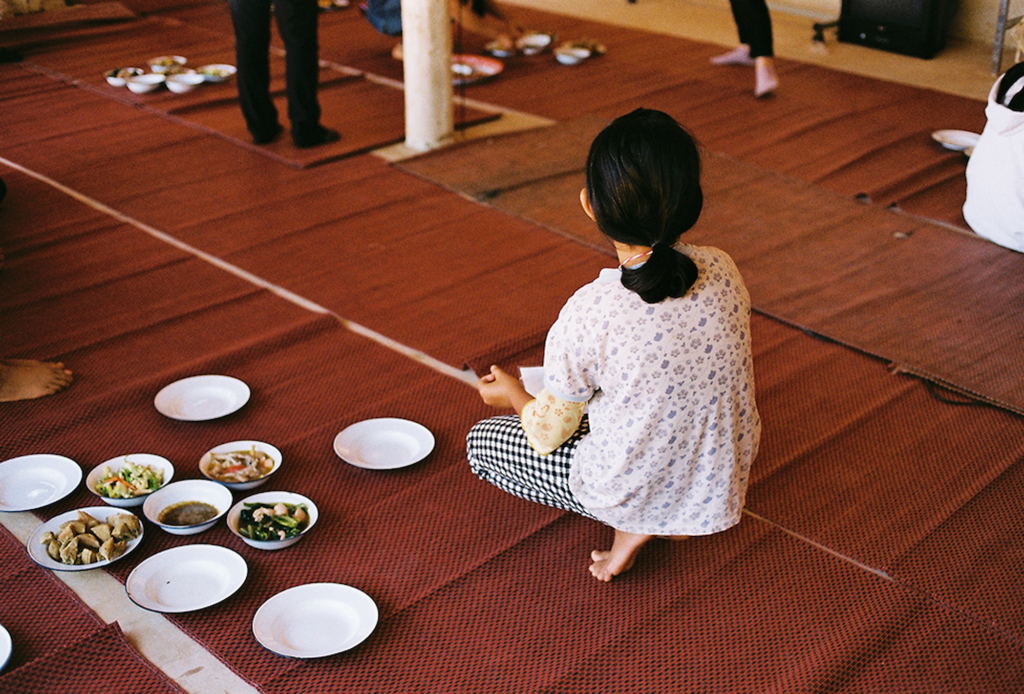
A girl who migrated from Myanmar to Thailand with her family. Photo: ECPAT International
To protect those that are most vulnerable to trafficking and sexual exploitation, the Thai government has enacted progressive policies that guarantee migrants access to many essential services regardless of legal status, including education and health care. However, barriers continue to hamper their use of these services in practice. Only 51 percent of all eligible migrants are currently enrolled in public health insurance schemes, while up to 200,000 migrant children remain out of school. The lack of access to these social safety nets, language barriers and low economic and social status contribute to the vulnerability of children to different forms of trafficking, especially sexual exploitation.
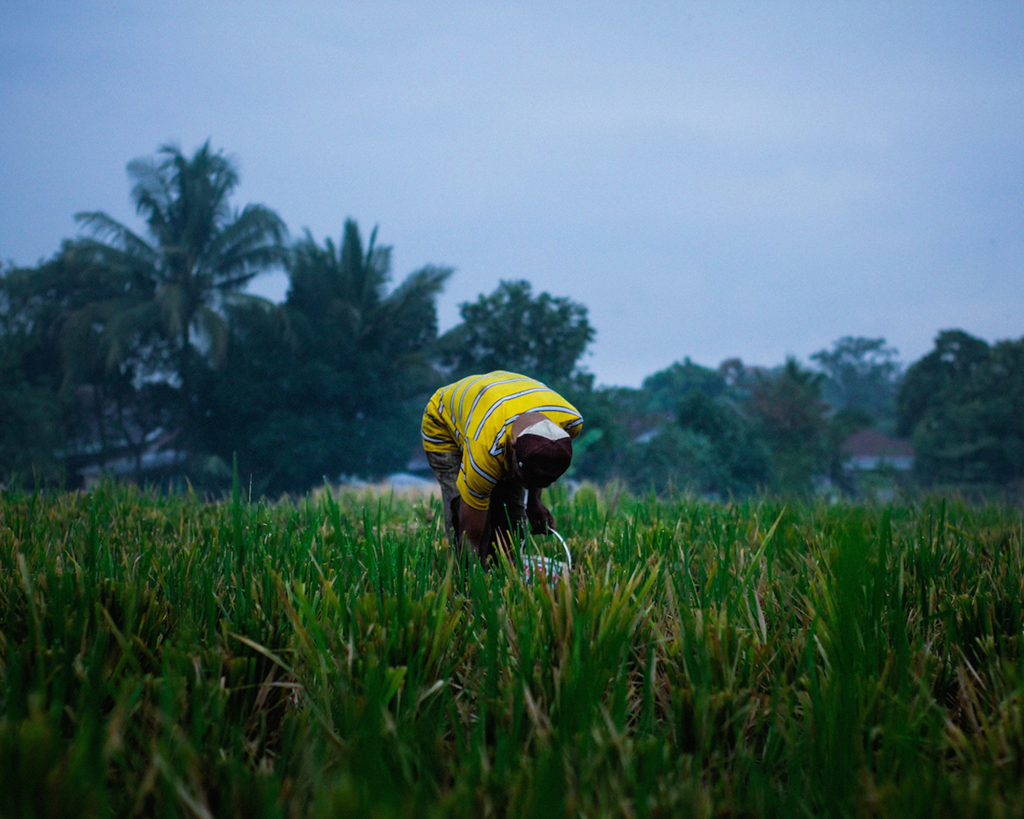
Migrant agricultural workers are especially affected by injustices in Thailand
To prevent exploitation against migrant workers and their families and to ensure their safe migration into Thailand, ECPAT Sweden and the faith-based development organisation Diakonia, started the project Safe Migration. Together with partner organisations, Diakonia in Thailand is working in this project on issues related to human rights, local democracy, social and economic justice and gender equality. One particular focus of their work includes the rights of stateless people and ethnic minorities. Agricultural workers are especially affected by these injustices. Most of them do not receive the most basic protections including minimum wage, overtime pay, rest time, annual leave, sick leave and social security.
Most migrant workers do not receive minimum wage.
According to Thai labour law, the minimum wage is set to 310 baht per day, a sum most employers do not pay even though it’s punishable by up to 6 months in jail and a 100,000 baht fine. As long as few regulations are in place – and even for those that are in place but are not followed – low wages, unsafe living and working conditions and lingering problems with child labour will persist.

Southeast Asia has long been recognised as a significant source region for trafficking of children for sexual purposes. There are many reasons for this; high levels of regional migration, illegal migration, economic imbalances and local demand for the sexual services of children—to name a few. Children in the region are trafficked for jobs such as domestic services, factory work, agriculture, fishing, construction, begging, forced marriage and adoption, but the trafficking of children for sexual exploitation continues to be one of the most common purposes for trafficking.
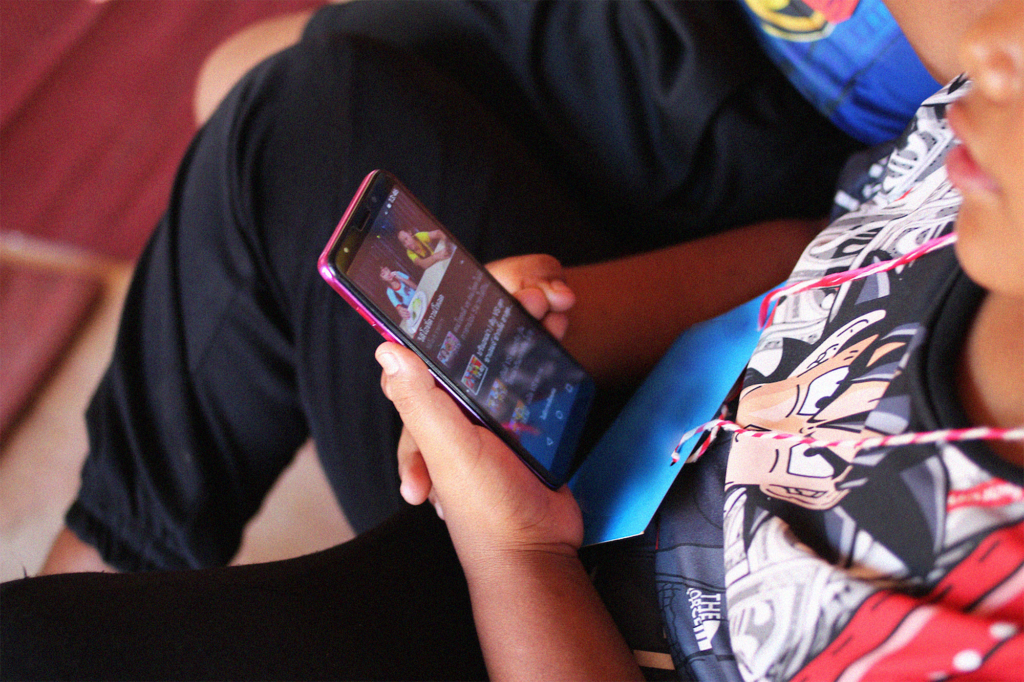
Many children in Thailand have access to a smartphone and internet – something trafficking recruiters take advantage of. Photo: ECPAT International.
Often, children are recruited through online brokers or agents giving false promises of employment opportunities, better economic conditions and well-paid work overseas. Instead, they end up in a situation of sexual exploitation. Today, the internet is a goldmine for recruiters. Through social media and chat rooms, they can easily advertise and get in contact with children and youth looking for new livelihood opportunities.
Parents often have little or no idea of what happens online.
This is a huge challenge in preventing trafficking as parents often have little or no idea of what happens online. There are many cases of children trafficked to Thailand without parents knowing, but there are also cases where children are encouraged by parents or friends into joining exploitative labour.
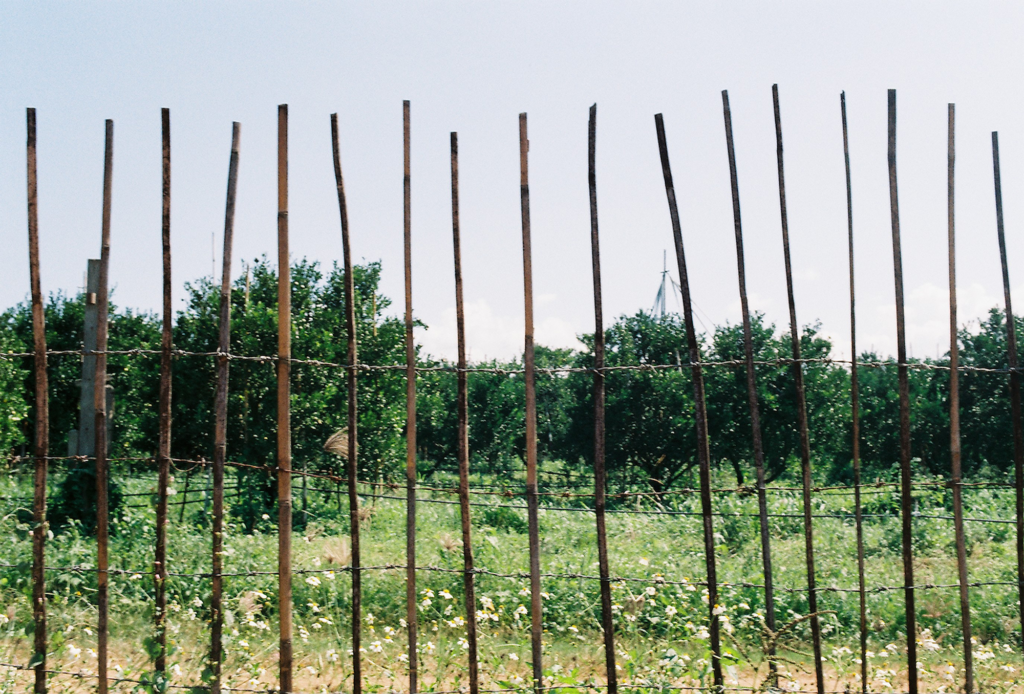
An orange farm somewhere in Thailand. Photo: ECPAT International.
At the border between Thailand and Myanmar, Diakonia Thailand supports local partners to strengthen the rights and working conditions of migrant workers. One initiative is the Migrant Support Networks. They serve as a forum where migrants can access training on human and labour rights and advise on their situation.
Many employers see migrant workers as lower-class citizens who are willing to work for less than minimum wage.
Unfortunately, the mobilisation of migrant workers has led to severe tension between local organisations and businesses providing jobs in the region. Many employers see migrant workers as lower-class citizens who are willing to work for less than minimum wage. To some businesses, labour rights mean less revenue and additional responsibilities.
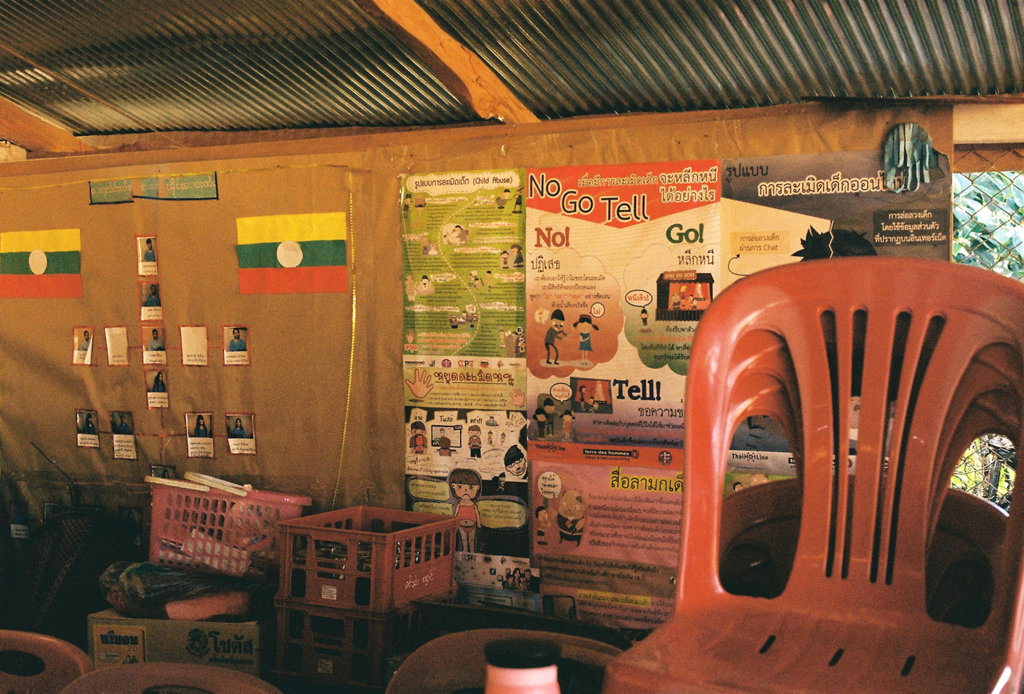
A workshop on children’s rights and sexual exploitation somewhere in Thailand. Photo: ECPAT International
For many migrant workers coming to Thailand, an orange farm is the first stop. Once there, they are accomodated in simple housing with their families next to the farm. The wage agreements between the farm owner and the workers differ, but most workers do not receive minimum wage. The employers argue that the ”free” housing is to be considered a benefit equivalent to minimum wage, and a reason for them to not pay adequate salaries. However, the only ones who benefit from an agreement like this are the employers.
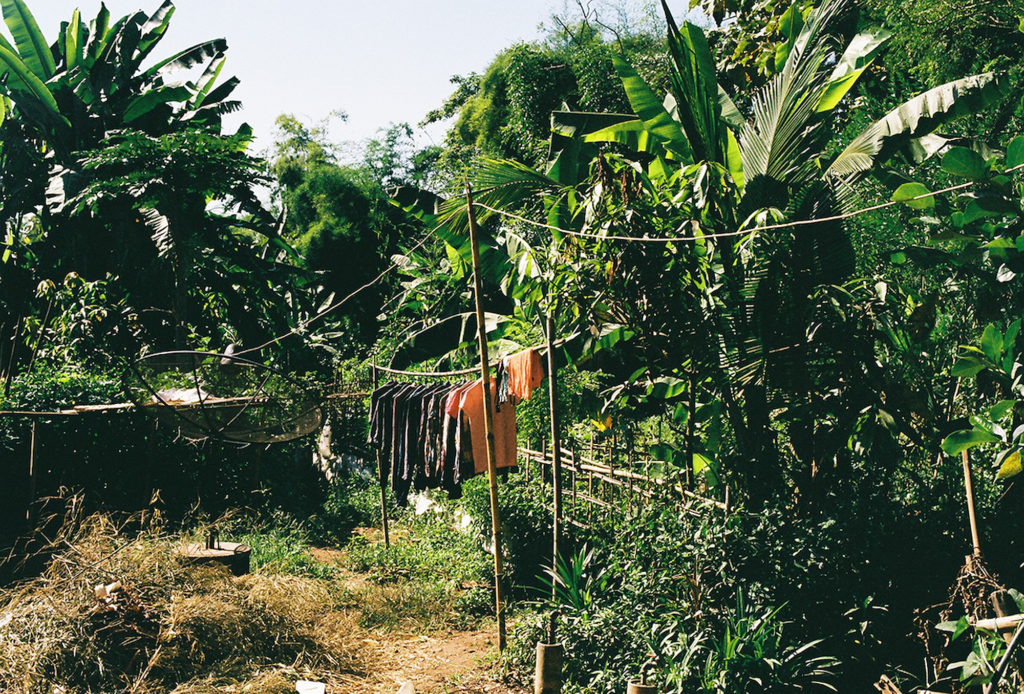
The backyard of migrant workers somewhere in Thailand. Photo: ECPAT International.
But everyone’s journey doesn’t start at an orange farm. Others arrive with a debt to pay to the broker who helped them cross the border—something that can take years to pay back. Many children in these communities go to school during the weekdays, but on weekends almost all of them help their parents at the farm where they are exposed to harmful chemicals.
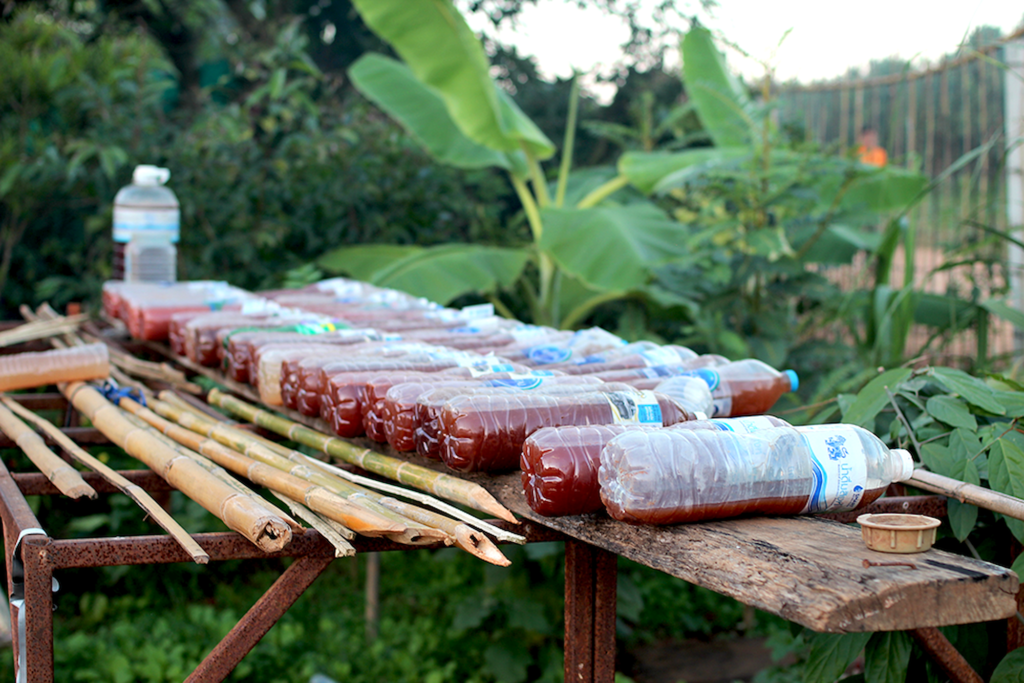
Children help their parents during weekends and are exposed to toxic chemicals. Photo: ECPAT International.
One orange farm that is part of the Safe Migration project, has a history with sexual exploitation. A few years back, a man came to the farm and managed to lure two girls into coming with him by offering them candy. He forced them to take their clothes off so that he could take photos to share on Facebook.
He forced them to take their clothes off so that he could take photos to share on Facebook.
The girls luckily returned to the farm and their families, but the images of them are still out there. To prevent this from happening again, ECPAT Foundation Thailand became a part of the Safe Migration project. Once a month, they invite children in the community to participate in activities focusing on increasing youth’s knowledge of – and resistance to – sexual exploitation.
This is the first article in a series of two where we report on the issue of trafficking and sexual exploitation in Thailand. In the next story, you will get to know Monting, a 17-year-old girl living in one of the orange farms. She participated in many youth workshops and is now a youth leader in her community – responsible for sharing her knowledge with others.